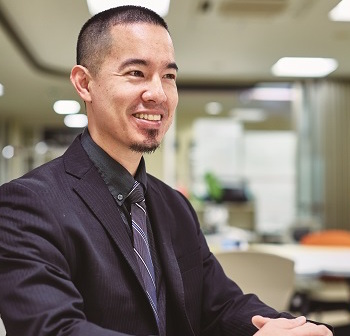
Bradford Lee |
1. Why did you choose Anaheim University’s Ed.D. in TESOL program?
- I chose Anaheim University's Ed.D. TESOL program to have the opportunity to work with some of the biggest and most influential researchers and practitioners in the field.
2. Can you tell us about your career to date?
- I have been living and working in Japan since 1999 and have taught students of all ages and levels from 6 months to 90 years old. I have worked in Eikaiwa, public elementary and junior high schools, and 2-year colleges. I'm currently a Lecturer with tenure at a private university.
3. How do you expect your Ed.D. to further your career?
- I believe the obtainment of a Ed.D. allows me to be competitive for promotion to higher levels (Associate or Full Professor) at my institution, and adds gravitas and a sense of trust when I apply for grants and federal funding which are important for my career development.
4. Can you share a favorite memory from Anaheim University?
- My favorite memory from Anaheim University was during the Residential Sessions, where we had the chance to meet with our professors and classmates face-to-face.
5. Did you have a favorite class at Anaheim University?
- My favorite class was probably Instructed Second Language Acquisition (EDU 700) with Dr. Rod Ellis. This class was a thorough review of theories and methodologies that form the basis of our entire field and being able to discuss them with Dr. Ellis was an amazing opportunity.
6. How did you enjoy the online experience?
- I thought the online experience was great, and very convenient. Luckily the time zone difference between CA and Japan was such so that classes were always held Saturday morning for me, so attendance was mostly possible. On the times when I'd be traveling or working, I was able to use the app on my mobile with Bluetooth earbuds!
7. Who would you recommend Anaheim University Ed.D. program?
- I think that anyone could benefit greatly from Anaheim's Ed.D. program.
8. What were the challenges in your program?
- For me, the biggest challenge was keeping up with the weekly discussion forum (DF) assignments, which required heavy reading and thought in order to answer in a meaningful manner. However, as difficult and inconvenient as they were, there's no doubt that they FORCED me to do my reading in a timely manner, which translated into an increased experience at the end of the week at the real-time sessions with the professor.
9. In your opinion, how does learning TESOL improve careers for ESL teachers?
- I think that learning theory and current practices helps ESL teachers in the classroom because it addresses many issues that ESL may be having and gives suggestions to the root cause and possible solutions. In the case where the solutions don't work quite exactly right, it becomes possible for the teacher to engage in action research and become part of the discussion, rather than feeling frustrated or despair on their own.
10. Please tell us about your experience in the Oral Defense. Were you nervous beforehand?
- Of course I was nervous! I was not really sure what to expect, and therefore I think I over-prepared with my PowerPoint slides, etc. Many of the questions I was asked were hard-hitting, make-or-break style questions and even though I had been working on my project for almost a full year, there were many aspects that I realized I had overlooked. Fortunately, I was able to justify most of my decisions in the project. Those aspects that were lacking, I was able to address in revisions.
11. What was your dissertation topic and why did you select it?
- My dissertation was on Pronunciation Instruction, namely, what is the best way to teach it. This had always been an interesting topic for me, as it was my experience that many of my students would speak grammatically correct sentences but would still not be understood by native speakers due to their accents. The students would think that they were using the wrong vocabulary or grammar and try to rephrase or go into a panic, when really the issue was a simple one of intonation, etc. Seeing this scene played out hundreds of times, especially when I would bring groups of students to the U.S. for study abroad, made me interested in developing the most effective system of instruction.
12. Which residential sessions did you attend and what did you like best about them?
- I went to both Residentials held in Tokyo (2016, 2018). The best part of the sessions were not only the lectures themselves, but also being able to go out for a meal and a drink with our classmates and professors.
13. How did you feel connected to your learning community?
- Attending the Residentials, which have open seminars on the 3rd day, helped me feel a sense of connection with my A.U. classmates and also the field of TESOL on the whole.
14. What are your future plans now that you have completed the Ed.D.?
- Now that I've completed the Ed.D. I have been finishing up some projects that I had left open while I pushed for the finish line, while also starting new projects that I can focus on now that my workload had considerably lightened. I'm currently working on projects involving:
• TESOL teacher motivation
• pronunciation
• task-based instruction
• curriculum design
• dyslexia
15. What advice can you give to new students entering the Ed.D. program?
- My advice for new students entering the Ed.D. program: just do it! I think the thing that kills a lot of projects, dreams, and sometimes careers, is wasting time. Wasting time debating whether to do a thing or not or procrastinating. I tried to just grab a can of Monster, sit down at my computer, and START. That's the only one you're ever going to FINISH! (^-^)
